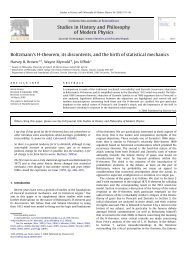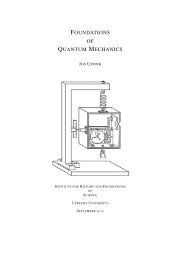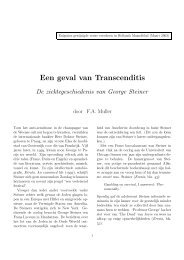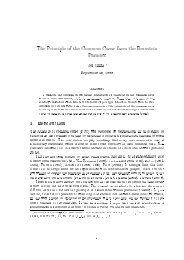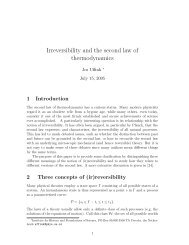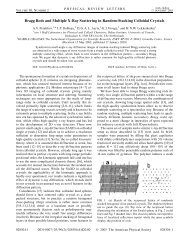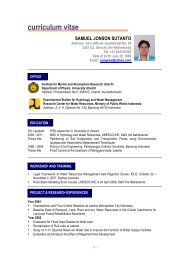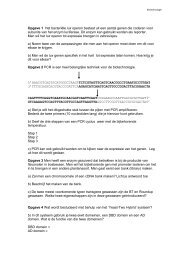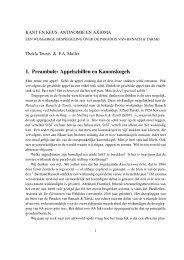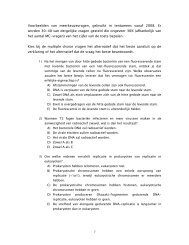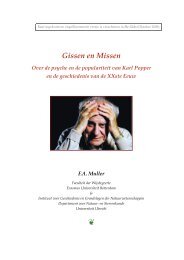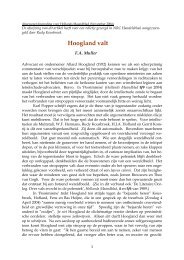Subjective probability and statistical physics
Subjective probability and statistical physics
Subjective probability and statistical physics
Create successful ePaper yourself
Turn your PDF publications into a flip-book with our unique Google optimized e-Paper software.
definition: consider some measurable space 〈X, A〉 Suppose a 1 , a 2 , a 3 , . . . is an infinite<br />
sequence of ‘event variables’, i.e. a i take values in {A, ¬A} for some given A ∈ A.<br />
The sequence is called exchangeable just in case, for every n ∈ N the <strong>probability</strong><br />
P (a 1 , . . . a n ) is invariant under all permutations π of {1, . . . , n). in other words:<br />
P (a 1 , . . . , a n ) = P (a π(1) , . . . , a π(n) ).<br />
Here, P is just any <strong>probability</strong> measure over the measurable space 〈X ∞ , A ∞ 〉. We<br />
do not presuppose that the sequence of events are independent <strong>and</strong> identically distributed!<br />
If we take, as before, E kn to st<strong>and</strong> for the event that in a sequence of n trials A<br />
has happened k times <strong>and</strong> failed n − k times, de Finetti’s theorem states:<br />
Exchangeability The sequence a 1 , a 2 , a 3 , . . . is exchangeable if <strong>and</strong><br />
only if there is a <strong>probability</strong> density function φ such that<br />
( ∫ n 1<br />
P (E kn ) = p<br />
k) k (1 − p) n−k φ(p)dp (8)<br />
0<br />
A few remarks about this theorem. First of all, one may note that this is almost<br />
as good as Bayes’ approach, for the result (8) implies that we can calculate the<br />
<strong>probability</strong> that a next trial will show event A as<br />
P (A n+1 |E kn ) = n + 1<br />
∫ 1<br />
0 pk+1 (1 − p) n−k φ(p)dp<br />
∫<br />
k + 1 1<br />
0 pk (1 − p) n−k φ(p)dp<br />
(9)<br />
<strong>and</strong> other such conditional probabilities in the same fashion. That is to say, the<br />
Exchangeability Theorem gives us the same result as Bayes, in the special case of<br />
choosing φ uniform. But in (8), of course φ might take any form. This absence of a<br />
rule deciding the choice of φ is of course concomitant with the radical subjectivist’s<br />
rejection of the Principle of Insufficient Reason.<br />
Secondly, note that the predicate “exchangeable”, although attributed to a sequence<br />
of events, is not a property of the sequence but of a <strong>probability</strong> measure.<br />
Hence whether or not a sequence is exchangeable is as subjective as the <strong>probability</strong><br />
itself, <strong>and</strong> reasonable persons are permitted to differ in their opinion about it.<br />
Third, <strong>and</strong> perhaps most crucially, no unknown <strong>probability</strong> is posited in this<br />
theorem. The point is that even though we allow probabilities to be defined only<br />
on sequences of events, given exchangeability, our belief in future events is just the<br />
same as if we believed in the existence of some objective quantity p, attributing a<br />
<strong>probability</strong> density φ to its various values, <strong>and</strong> adopted the Principal Principle. But<br />
none of these ingredients are posited as postulates for how to deal with an event<br />
about which we know nothing; they are derived from the theorem above.<br />
Of course, there is a price to be paid: instead of considering an event ”concerning<br />
the <strong>probability</strong> of which we know nothing antecedently to any trials being made”, De<br />
Finetti has to substitute the assumption that a sequence of such events are exchangeable.<br />
But this is hardly a drawback. Indeed, precisely because De Finetti’s theorem<br />
is explicit in stating this assumption, his approach avoids many objections to Bayes’<br />
procedure.<br />
10



